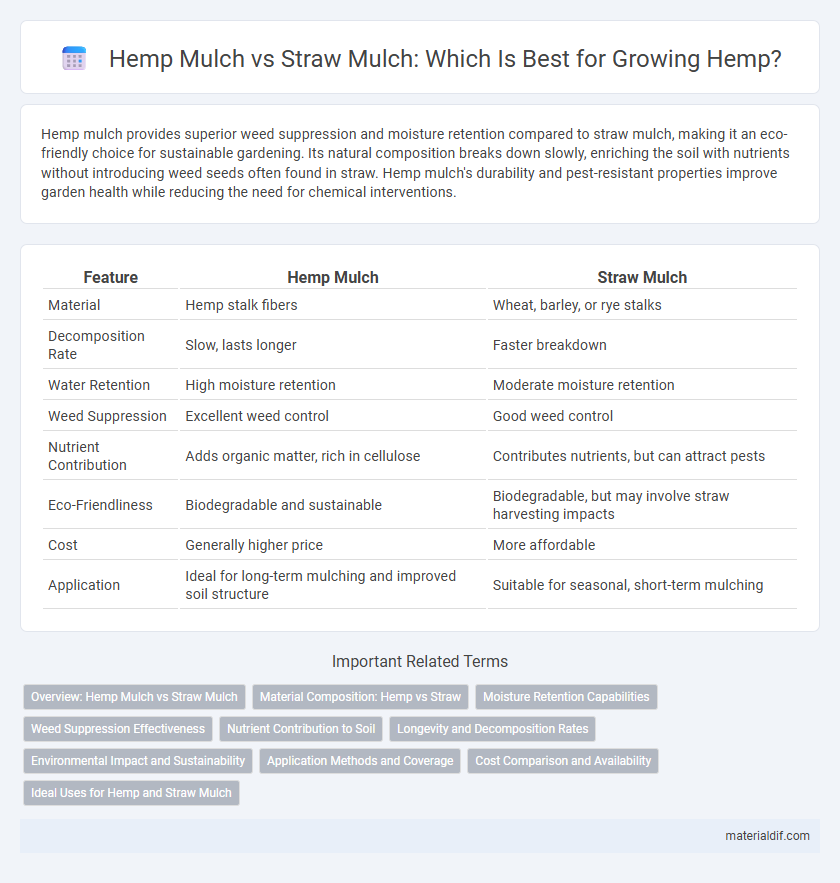Hemp mulch provides superior weed suppression and moisture retention compared to straw mulch, making it an eco-friendly choice for sustainable gardening. Its natural composition breaks down slowly, enriching the soil with nutrients without introducing weed seeds often found in straw. Hemp mulch's durability and pest-resistant properties improve garden health while reducing the need for chemical interventions.
Table of Comparison
| Feature | Hemp Mulch | Straw Mulch |
|---|---|---|
| Material | Hemp stalk fibers | Wheat, barley, or rye stalks |
| Decomposition Rate | Slow, lasts longer | Faster breakdown |
| Water Retention | High moisture retention | Moderate moisture retention |
| Weed Suppression | Excellent weed control | Good weed control |
| Nutrient Contribution | Adds organic matter, rich in cellulose | Contributes nutrients, but can attract pests |
| Eco-Friendliness | Biodegradable and sustainable | Biodegradable, but may involve straw harvesting impacts |
| Cost | Generally higher price | More affordable |
| Application | Ideal for long-term mulching and improved soil structure | Suitable for seasonal, short-term mulching |
Overview: Hemp Mulch vs Straw Mulch
Hemp mulch provides superior soil moisture retention and natural weed suppression compared to straw mulch, enhancing sustainable gardening practices. Its high lignin content slows decomposition, creating a longer-lasting protective layer that enriches soil organic matter over time. Straw mulch, while effective for erosion control and temperature regulation, decomposes faster and may introduce weed seeds, making hemp mulch a more efficient choice for long-term soil health.
Material Composition: Hemp vs Straw
Hemp mulch is derived from the fibrous stalks of the Cannabis sativa plant, offering a high lignin content that promotes slow decomposition and long-lasting soil protection. Straw mulch, composed primarily of cereal crop stalks such as wheat, barley, or oats, contains lower lignin and higher cellulose, resulting in faster breakdown and nutrient release into the soil. The dense, durable structure of hemp mulch provides superior weed suppression and moisture retention compared to the lighter, more brittle composition of straw mulch.
Moisture Retention Capabilities
Hemp mulch offers superior moisture retention compared to straw mulch due to its dense fiber structure that reduces evaporation and maintains soil hydration longer. The thick, interwoven hemp fibers create a breathable barrier that helps regulate soil temperature and moisture levels effectively. Studies show hemp mulch can retain up to 30% more water in the soil than traditional straw mulch, promoting healthier plant growth.
Weed Suppression Effectiveness
Hemp mulch offers superior weed suppression compared to straw mulch due to its dense coverage and slower decomposition rate, which limits sunlight exposure and inhibits weed seed germination. Studies show hemp mulch reduces weed growth by up to 70%, while straw mulch typically achieves around 50% effectiveness. The natural antifungal properties of hemp also contribute to healthier soil conditions, further supporting robust plant growth and weed control.
Nutrient Contribution to Soil
Hemp mulch delivers higher nutrient value than straw mulch by decomposing quickly and enriching soil with nitrogen, phosphorus, and potassium. Its fibrous structure retains moisture and promotes beneficial microbial activity, accelerating nutrient cycling. Straw mulch, primarily carbon-rich, offers less immediate nutrient input but improves soil organic matter over time.
Longevity and Decomposition Rates
Hemp mulch demonstrates superior longevity compared to straw mulch, typically lasting up to 12 months due to its dense fiber composition, which slows decomposition. Straw mulch generally decomposes within 2 to 3 months, requiring more frequent reapplication to maintain soil coverage. The slower decomposition rate of hemp mulch enhances soil moisture retention and weed suppression over extended periods, optimizing garden health and reducing labor.
Environmental Impact and Sustainability
Hemp mulch offers superior environmental benefits compared to straw mulch due to its rapid biodegradability and ability to improve soil health by adding organic matter and nutrients. Hemp cultivation requires fewer pesticides and less water, reducing the ecological footprint associated with its production. Straw mulch, while effective, often involves more resource-intensive farming practices and slower decomposition rates, making hemp mulch a more sustainable choice for eco-conscious gardening and agriculture.
Application Methods and Coverage
Hemp mulch offers superior soil coverage with a denser and longer-lasting application compared to straw mulch, reducing weed growth and moisture evaporation more effectively. Its fibrous texture allows for easier spreading and better soil adherence, minimizing displacement during heavy rains or wind. Straw mulch requires thicker layering to achieve similar coverage, often necessitating more frequent replenishment to maintain soil protection.
Cost Comparison and Availability
Hemp mulch generally costs more than straw mulch due to its processing and lower mass production scale, with prices averaging around $30 to $60 per bale compared to straw's $10 to $30 per bale. Availability of hemp mulch remains limited in many regions, largely concentrated in areas with established hemp farming, while straw mulch is widely available nationwide from grain and cereal crop producers. Farmers seeking cost-effective, readily accessible mulch solutions often prefer straw, whereas those targeting sustainable or organic practices may invest in the higher-priced but durable hemp mulch.
Ideal Uses for Hemp and Straw Mulch
Hemp mulch excels in moisture retention and weed suppression, making it ideal for vegetable gardens and flower beds where soil health is crucial. Straw mulch is best suited for protecting root crops and preventing soil erosion in large-scale farming or areas with heavier rainfall. Both mulches improve soil organic matter but differ in decomposition rates, with hemp breaking down slower, providing longer-lasting coverage.
hemp mulch vs straw mulch Infographic

 materialdif.com
materialdif.com